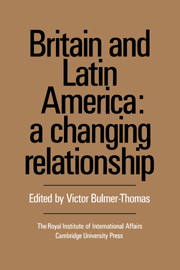1 - Britain and Latin America in historical perspective
Published online by Cambridge University Press: 02 December 2009
Summary
There can be no field of enterprise so magnificent in promise, so well calculated to raise sanguine hopes, so congenial to the most generous sympathies, so consistent with the best and highest interests of England as the vast continent of South America.
Henry Brougham, House of Commons, 13 March 1817For more than a century – from the Napoleonic Wars and, more especially, from the dramatic events of 1807–8 in the Iberian Peninsula which eventually led to the breakup of the American empires of both Spain and Portugal – Britain was the dominant external actor in the economic and, to a lesser extent, the political affairs of Latin America. The foundations of British commercial and financial pre-eminence in Latin America were firmly laid at the time of the formation of the independent Latin American states during the second and third decades of the nineteenth century. Throughout the century which followed, until the outbreak of the First World War in 1914, Britain supplied more of the manufactured and capital goods imported into Latin America, more of the loans given to the new Latin American governments and more of the capital invested in Latin American infrastructure (above all, railways), agriculture and mining than any other nation. British merchant houses and, from the 1860s, British banks played a central role in the Latin American economies. British ships carried the bulk of the produce exported from Latin America and Britain was itself a major market for Latin American food and raw materials. The nineteenth century was the ‘British century’ in Latin America.
- Type
- Chapter
- Information
- Britain and Latin AmericaA Changing Relationship, pp. 1 - 24Publisher: Cambridge University PressPrint publication year: 1989
- 3
- Cited by



